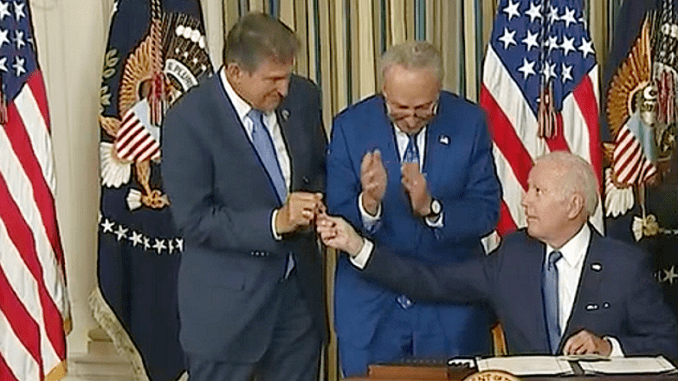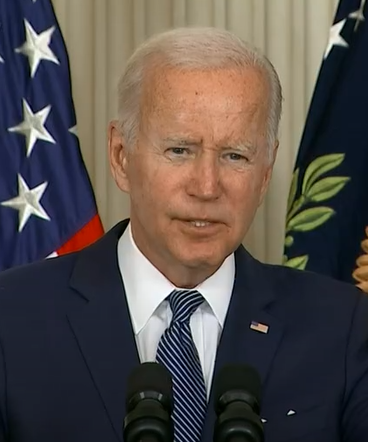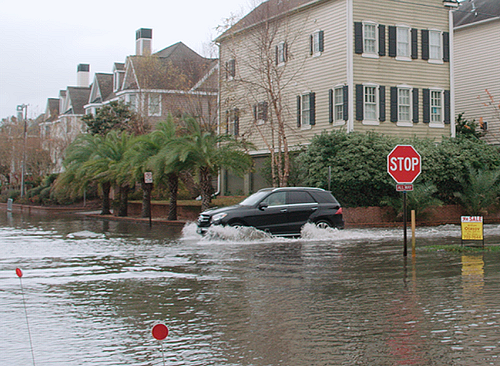
WASHINGTON, DC, August 18, 2022 (ENS) – As President Joe Biden signed the $739 billion Inflation Reduction Act into law at the White House on Tuesday, he showcased what motivates his politics, and Democratic politics in general, exclaiming, “Let me say from the start: With this law, the American people won and the special interests lost!”
“We are in a season of substance,” Biden declared as his administration chalked up this big victory – purely along party lines. The new law will create hundreds of thousands of good-paying jobs, put more electric vehicles on the roads and build clean energy infrastructure to reduce greenhouse gases in the atmosphere. But it will also enable more oil and gas leasing, a measure to which environmentalists are opposed.
“Every single Republican in the Congress sided with the special interests in this vote,” Biden said. “Every single Republican – every single one – voted against tackling the climate crisis, against lowering our energy costs, against creating good-paying jobs.”
“This administration began amid a dark time in America,” Biden recalled, “a once-in-a-century pandemic, devastating joblessness, clear and present threats to democracy and the rule of law, doubts about America’s future itself.”
“And yet,” the President said, “we’ve not wavered. We’ve not flinched. And we’ve not given in. Instead, we’re delivering results for the American people. We didn’t tear down; we built up. We didn’t look back; we looked forward.”
“And today – today offers further proof that the soul of America is vibrant, the future of America is bright, and the promise of America is real and just beginning,” Biden said to applause.
Biden’s Inflation Reduction Moves
Inflation has been painful for the American people over the past year, contributing to low polling numbers for Biden. But the United States is just part of a global economic shift.
In early 2021, a worldwide increase in inflation began due to supply shortages of energy and of computer chips caused by the COVID-19 pandemic and the Russian invasion of Ukraine, coupled with strong consumer demand. As a result, many countries have seen their highest inflation in decades and their central banks have responded by raising interest rates.
Since he took office in January 2021, President Biden says he’s been fighting inflation.

He said at the bill signing, “In addition to cutting the deficit by $350 billion last year, in my first year in office, and cutting it $1.7 trillion this year, this fiscal year, we’re going to cut the deficit – I point out – by another $300 billion with the Inflation Reduction Act over the next decade.”
There’s a new tax in the law. As Biden explained, “Big corporations will now pay a minimum 15 percent tax instead of us. Fifty-five of them got away with paying zero dollars in federal income tax on $40 billion in profit.”
“We’re cutting deficit to fight inflation by having the wealthy and big corporations finally begin to pay part of their fair share,” the President said.
“And I’m keeping my campaign commitment: no one – let me emphasize – no one earning less than $400,000 a year will pay a penny more in federal taxes,” Biden reiterated to applause.
For the first time, the new law also gives Medicare the power to negotiate prices on some drugs. So seniors are going to pay less for their prescription drugs. The law also puts a cap of $2,000 a year on each Medicare recipient’s prescription drug costs, no matter the reason for the prescriptions.
Climate Rescue Funding is On the Way
The Inflation Reduction Act invests $369 billion to take the most aggressive action the United States has ever taken in confronting the climate crisis and strengthening energy security.
“It’s going to offer working families thousands of dollars in savings by providing them rebates to buy new and efficient appliances, weatherize their homes, get tax credit for purchasing heat pumps and rooftop solar, electric stoves, ovens, dryers,” Biden said.
The new law gives consumers a tax credit to buy electric vehicles and fuel cell vehicles, new or used. And it gives them a tax credit of up to $7,500 if those electric vehicles were made in America.
“American auto companies, along with American labor, are committing their treasure and their talent – billions of dollars in investment – to make electric vehicles and battery and electric charging stations all across America, made in America.”
This new law also provides tax credits that will create What Biden said are “tens of thousands” of good-paying clean energy manufacturing jobs in solar factories in the Midwest and the South, at wind farms across the plains and off U.S. shores, and with clean hydrogen projects all across America.
“This bill is the biggest step forward on climate ever and it’s going to allow us to boldly take additional steps toward meeting all of my climate goals – the ones we set out when we ran,” President Biden said.
“It includes ensuring that we create clean energy opportunities in frontline and fence-line communities that have been smothered – smothered by the legacy of pollution, and fight environmental injustice that’s been going on for so long,” he said.
Over at the U.S. Environmental Protection Agency, Administrator Michael Regan sees the ravages of climate change up close. “Every day, people are experiencing flooding, heatwaves, extreme storms, wildfires, rising energy costs, and other impacts brought on by climate change. Vulnerable communities are being hit first and worst,” he said.

“EPA is ready to advance President Biden’s bold environmental agenda, ensure these investments reach the communities that need them most, and make people’s lives healthier today and in the future,” Regan said.
“We will use these unprecedented resources to reduce harmful air pollution in places where people live, work, play, and go to school. We will accelerate our work on environmental justice and empower community-driven solutions in overburdened neighborhoods. We will aggressively combat damaging climate pollution while supporting the creation of good jobs and lowering energy costs for families,” the EPA administrator said. “With this legislation, we will deliver progress for people and the planet.”
The Critics Have Their Say
Naturally, critics abound. As Jonathan Thompson writes in “High Country News, “There is plenty in the 755-page bill for climate hawks to celebrate, including $369 billion for wind and solar tax credits, clean energy innovation, electric vehicle incentives and methane leak mitigation. But there’s also a buzzkill or two, with page 669 receiving the most ire: Before the federal government can issue a renewable energy right of way on public lands, it must offer at least 2 million acres per year for onshore oil and gas leasing. While the concession was necessary to get Sen. Joe Manchin, D-W.V., on board, it also directly contradicted the bill’s myriad emissions-cutting measures.”
The nationwide nonprofit Natural Resources Defense Council, NRDC, has similar objections, As Andrew Wetzler writes on the NRDC site today, “For all its strengths, this is not the climate bill NRDC would’ve written. It includes provisions that promote fossil fuels in ways that conflict with our climate aims – and our energy security.”
“Specifically, the bill links deployment of wind and solar projects to access to oil and gas drilling on federal lands and U.S. ocean waters. That provision has no place in a climate bill. It’s deeply problematic, and it will put some of the nation’s most vulnerable communities and ecosystems at needless risk,” he writes.
“The goal must be to break our dependence on fossil fuels and shift to energy sources that are cleaner, more sustainable, and more secure. Unfortunately, the bill contains some provisions that move us in the wrong direction. We will do everything we can to minimize the impact of these misguided provisions and mitigate the harm they cause,” Wetzler maintains.
The Alliance for Automotive Innovation, an industry association with members that produce 98 percent of all new cars and light trucks sold in the United States, says the new law is a “missed opportunity.”
John Bozzella, president and CEO of the Alliance for Automotive Innovation said, “The Inflation Reduction Act recognizes the enormity of the automotive industrial base transformation currently underway. Automakers have already invested more than $100 billion in vehicle electrification – expanding the production of EVs inside the United States and across North America and locating raw material and battery components on American soil.”
“On the demand front, we’ve said the legislation’s purchase incentive was a missed opportunity, especially while raw material and battery supply chains are still coming into place,” Bozzella said.
“But Congress also made some meaningful investments on the supply side. There is more than $15.5 billion in incentives and grants to ensure the United States is building automotive supply chains and a globally competitive battery manufacturing platform,” he said.
“Over the long haul, that’s going to be essential to making the widest range of EVs available to millions of additional drivers in all corners of the country.”
“The auto industry will continue to work with the Biden administration and Treasury Department as they issue critical guidance and new regulations,” said Bozzella, “so the EV tax credit is as available and beneficial to consumers as possible, and the manufacturing provisions accelerate the auto transformation already in progress.”
President Biden hears the critics, but his motivation is firm. “I know there are those here today who hold a dark and despairing view of this country. I’m not one of them,” he said at the White House, after the signing ceremony was complete.
“I believe in the promise of America,” the President said. “I believe in the future of this country. I believe in the very soul of this nation. And most of all, I believe in you, the American people.”
Featured image: At the signing of the Inflation Reduction Act, from left, Senator Joe Manchin of West Virginia, Senate Majority Leader Chuck Schumer of New York, President Joe Biden, House Majority Whip Jim Clyburn of South Carolina, all Democrats. August 16, 2022, State Dining Room, The White House, Washington, DC. (Screengrab from C-Span video)
© 2022, Environment News Service. All rights reserved. Content may be quoted only with proper attribution and a direct link to the original article. Full reproduction is prohibited.



